|
|
|
Sort Order |
|
|
|
Items / Page
|
|
|
|
|
|
|
| Srl | Item |
| 1 |
ID:
184252


|
|
|
|
|
| Summary/Abstract |
Our understanding of modern authoritarianism lacks a satisfying explanation for the genuine popularity of autocrats. While most of the literature on authoritarianism focuses on coercion, institutional manipulation, or clientelism, many contemporary autocrats clearly enjoy enthusiastic support even in times of economic stagnation or decline. We argue that part of the solution lies in unpacking the role of emotions in building support for rulers. Drawing on a unique panel survey conducted shortly before and after Russia’s annexation of Crimea, we discover that the resulting “rally” around the authoritarian flag involves much more than simply support for the leader or a simple increase in nationalism. Rather, we witness a broad shift in respondents’ emotional orientation. Driven by the shared experience of the Crimean “moment,” this shift improves people’s evaluation of their social, political, and economic surroundings in the present, the future—and even the past. The result is a new explanation of the nonmaterial means through which autocrats may succeed in bolstering their legitimacy.
|
|
|
|
|
|
|
|
|
|
|
|
|
|
|
|
| 2 |
ID:
133705
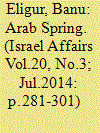

|
|
|
|
|
| Publication |
2014.
|
| Summary/Abstract |
This article argues that the 'Arab Spring' has ended the long-standing US-Israeli common strategy of supporting pro-Western and semi-secular autocracies in the Arab world. During these tumultuous events Washington chose to support the rebellions to varying degrees, thus exacerbating Israel's concerns regarding the adverse regional implications attending this shift (notably the ascendance of Islamist regimes and the diversion of world attention from Iran's nuclear quest). By way of ameliorating such threats, the US needs to pursue a policy of supporting pro-democracy groups in the region while formulating a clear policy to deal with the threats from Iran and radical Islamist groups. All in all, the 'Arab Spring' has created a highly volatile strategic environment thus making Israel an even more valuable strategic ally for the US
|
|
|
|
|
|
|
|
|
|
|
|
|
|
|
|
| 3 |
ID:
104326
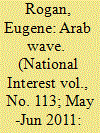

|
|
|
|
|
| Publication |
2011.
|
| Summary/Abstract |
FOR DECADES, the Arab world has lived under a variety of governments whose only point in common was the degree of autocracy they imposed on their citizens. Some blamed Arab culture, others said that Islam was incompatible with popular rule, but most agreed that the Arabs were bucking a global trend of democratization.
|
|
|
|
|
|
|
|
|
|
|
|
|
|
|
|
| 4 |
ID:
180194
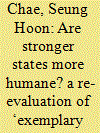

|
|
|
|
|
| Summary/Abstract |
In general, the human rights scholarship finds stronger states to be more humane. In particular, Englehart’s recent book and article assert that ‘petty despots’, rather than ‘exemplary villains’, are the real culprits behind the abuse of human rights. However, some exemplary villains are truly exemplary; providing them with greater powers will only intensify human rights abuses. Indeed, the idea that even dictatorships would better protect rights when stronger contradicts some of the most well-known cases of mass-murder that occurred in powerful authoritarian states. In an attempt to resolve this puzzle, this article argues that, while state capacity does matter, it matters differently for dictatorships and democracies. In both regimes, there are certain types of human rights violations that, from the government’s perspective, happen unwittingly. These unauthorized human rights violations are perpetrated by petty despots trying to benefit from the state’s principal–agent problems. Yet, unlike a democracy, a dictatorship can authorize the violation of certain types of human rights to accomplish its objectives. Whereas state capacity can reduce ‘unauthorized’ types of abuses, it would not necessarily diminish such abuses that are ‘authorized’ by the state. The net effects of state capacity, therefore, will not be as positive for autocracies as they are for democracies. To validate this argument, this article conducts 18 ordered logistic regressions with a time-series cross-sectional dataset that encompasses no less than 142 countries from the period of 1981 to 2002. The empirical analysis provides solid support for the theorized relationship among human rights, state capacity and regime type. As predicted, state capacity improves human rights in democracies but not necessarily in autocracies.
|
|
|
|
|
|
|
|
|
|
|
|
|
|
|
|
| 5 |
ID:
192141
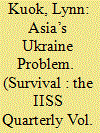

|
|
|
|
|
| Summary/Abstract |
Many Asian governments regard Russia’s war with Ukraine as a distant event with limited impact on the region, beyond rising food and energy prices and possibly increasing the risk of China attacking Taiwan. But the war has strained the rule of law and is entrenching ideological divisions, introducing unnecessary complexity into alliances and partnerships. Asian governments should be alert to the negative implications of these developments for regional peace and security. For them to condemn Russia’s invasion of Ukraine and defend the rule of law would not be to blindly support the West, and would be entirely consistent with their national interests. The West, for its part, should avoid worsening geopolitical fault lines. To this end, the United States might refrain from characterising great-power competition as a battle between autocracies and democracies, and from painting China and Russia with the same broad ideological brush.
|
|
|
|
|
|
|
|
|
|
|
|
|
|
|
|
| 6 |
ID:
173775
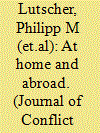

|
|
|
|
|
| Summary/Abstract |
In this article, we study the political use of denial-of-service (DoS) attacks, a particular form of cyberattack that disables web services by flooding them with high levels of data traffic. We argue that websites in nondemocratic regimes should be especially prone to this type of attack, particularly around political focal points such as elections. This is due to two mechanisms: governments employ DoS attacks to censor regime-threatening information, while at the same time, activists use DoS attacks as a tool to publicly undermine the government’s authority. We analyze these mechanisms by relying on measurements of DoS attacks based on large-scale Internet traffic data. Our results show that in authoritarian countries, elections indeed increase the number of DoS attacks. However, these attacks do not seem to be directed primarily against the country itself but rather against other states that serve as hosts for news websites from this country.
|
|
|
|
|
|
|
|
|
|
|
|
|
|
|
|
| 7 |
ID:
158867
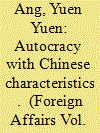

|
|
|
|
|
| Summary/Abstract |
Sooner or later this economy will slow,” the New York Times columnist Thomas Friedman declared of China [1] in 1998. He continued: “That’s when China will need a government that is legitimate. . . . When China’s 900 million villagers get phones, and start calling each other, this will inevitably become a more open country.” At the time, just a few years after the fall of the Soviet Union, Friedman’s certainty was broadly shared. China’s economic ascent under authoritarian rule could not last; eventually, and inescapably, further economic development would bring about democratization.
|
|
|
|
|
|
|
|
|
|
|
|
|
|
|
|
| 8 |
ID:
132972


|
|
|
|
|
| Publication |
2014.
|
| Summary/Abstract |
When the leader of an autocratic regime loses power, one of three things happens. The incumbent leadership group is replaced by democratically elected leaders. Someone from the incumbent leadership group replaces him, and the regime persists. Or the incumbent leadership group loses control to a different group that replaces it with a new autocracy. Much scholarship exists on the first kind of transition, but little on transitions from one autocracy to another, though they make up about half of all regime changes. We introduce a new data set that facilitates the investigation of all three kinds of transition. It provides transition information for the 280 autocratic regimes in existence from 1946 to 2010. The data identify how regimes exit power, how much violence occurs during transitions, and whether the regimes that precede and succeed them are autocratic. We explain the data set and show how it differs from currently available data. The new data identify autocratic regime breakdowns regardless of whether the country democratizes, which makes possible the investigation of why the ouster of dictators sometimes leads to democracy but often does not, and many other questions. We present a number of examples to highlight how the new data can be used to explore questions about why dictators start wars and why autocratic breakdown sometimes results in the establishment of a new autocratic regime rather than democratization. We discuss the implications of these findings for the Arab Spring.
|
|
|
|
|
|
|
|
|
|
|
|
|
|
|
|
| 9 |
ID:
075082
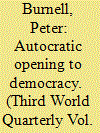

|
|
|
|
|
| Publication |
2006.
|
| Summary/Abstract |
As recent experiments in democratisation around the world show signs of achieving success, or failure, or more usually something in between, the attention of democracy promotion actors in the international community is turning to the world's remaining outstanding autocracies. This article identifies the autocracies, discusses the notion of autocratic opening, and explores how opening can come about, with particular reference to international intervention. The article argues that, for identifying the prospects for autocratic opening and determining the forms of constructive engagement available to international actors, it is useful to distinguish between the different grounds on which various autocracies claim legitimacy, and the specific vulnerabilities to which their principal legitimating base gives rise.
|
|
|
|
|
|
|
|
|
|
|
|
|
|
|
|
| 10 |
ID:
172340
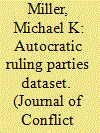

|
|
|
|
|
| Summary/Abstract |
How do autocratic ruling parties gain power? What predicts their durability and how they fall? This article introduces the Autocratic Ruling Parties Dataset, the first comprehensive data set on the founding origins, modes of gaining and losing power, ruling tenures, and other characteristics of autocratic ruling parties. It covers all ruling parties in the world from 1940 to 2015. Contrary to common assumptions, most ruling parties are not created by sitting dictators, but follow a range of paths to power that influence their style and duration of rule. To illustrate the data’s uses, the article confirms that ruling parties stabilize autocracies. Further, parties’ origins and histories matter, with revolutionary and foreign-imposed parties the most durable and parties empowered through elections the least durable. By recognizing ruling parties’ heterogeneity, histories, and potential autonomy from individual dictators, the data can contribute to open questions on autocratic politics, regime stability, and democratization.
|
|
|
|
|
|
|
|
|
|
|
|
|
|
|
|
| 11 |
ID:
172477
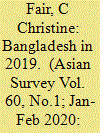

|
|
|
|
|
| Summary/Abstract |
After winning a third consecutive term as prime minister in the compromised December 2018 general election, Sheikh Hasina of the Awami League continues to consolidate one-woman rule. Throughout 2019, Hasina continued to persecute critics and opponents. Despite the deepening malaise of bad governance, Bangladesh has continued to enjoy impressive economic growth. But it remains haunted by the desperate Rohingya exodus from Myanmar, and the decades-old Bihari question.
|
|
|
|
|
|
|
|
|
|
|
|
|
|
|
|
| 12 |
ID:
187256
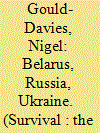

|
|
|
|
|
| Summary/Abstract |
Belarus’s recent arc offers three wider lessons for winding down the present international crisis over the Russia–Ukraine war and for planning the post-war order. Firstly, highly personalistic rule is prone to error. The flagrancy of Belarusian leader Alyaksandr Lukashenka’s electoral rigging ignited popular indignation, and the extreme brutality of the ensuing crackdown fanned popular outrage. Secondly, and paradoxically, autocracy is strong. Lukashenka’s tight control over all institutions of the state enabled him to prevent elites from defecting or losing the will to resist. Thirdly, ambiguities and compromises are unstable, and must sooner or later give way to clarifying choices. The post-war order must embed decisive outcomes, not unsustainable compromises. The West’s challenge is to enmesh a stable Ukraine in a wider peace that, for the third time in a century, builds a durable security order in Europe.
|
|
|
|
|
|
|
|
|
|
|
|
|
|
|
|
| 13 |
ID:
082032
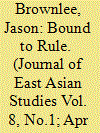

|
|
|
|
|
| Publication |
2008.
|
| Summary/Abstract |
This article revisits the electoral emphasis of hybrid regime studies, arguing instead that the impact of elections is structured by variations in prior political institutions, particularly the dismantlement or maintenance of a ruling party. Duration tests on 136 regimes indicate that ruling parties reduce the chance of regime collapse, while "electoral autocracy" has no significant effect. A paired comparison of Malaysia and the Philippines then shows how variations in party institutions propelled divergent courses of authoritarian dominance and democratization. During the late 1980s and 1990s, Malaysia's ruling party (UMNO) bound together otherwise fractious leaders, twice deflecting potent electoral challenges. By contrast, when Ferdinand Marcos abandoned the Nacionalista Party after 1972, he fueled the movement that would subsequently oust him. The efficacy of opposition parties Semangat '46 and United Nationalist Democratic Opposition (UNIDO) was thus heavily imbricated with the institutions of the regimes they challenged and less contingent on short-term electoral politics.
|
|
|
|
|
|
|
|
|
|
|
|
|
|
|
|
| 14 |
ID:
147312
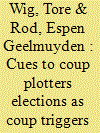

|
|
|
|
|
| Summary/Abstract |
A large proportion of coup attempts in autocracies occur in the aftermath of elections, yet little systematic research exists on the topic. Drawing on recent literature on elections in autocracies, we present an argument to explain postelection coups. While we recognize that electoral institutions have the potential to stabilize autocracies, we illustrate that the election event can spark instability when incumbents reveal electoral weakness. Electoral outcomes—in the form of vote shares and opposition reactions—are signals containing information about the strength of the opposition, and indirectly about the likelihood of a successful full-scale revolution that would compromise the privileged positions of regime elites. In these situations, coups are likely to be initiated to avoid a revolution, either by serving as concessions to the opposition or by facilitating increased repression. We perform a large-N study that supports our argument, significantly nuancing the claim that elections stabilize autocracies.
|
|
|
|
|
|
|
|
|
|
|
|
|
|
|
|
| 15 |
ID:
173005
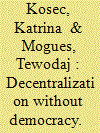

|
|
|
|
|
| Summary/Abstract |
Increasingly, decentralization is being adopted by countries in which assumptions made by formal models of decentralization, such as electoral accountability and population mobility, fail to hold. How does decentralization affect public service delivery in such contexts? The authors exploit the partial rollout of decentralization in the autocratic context of Ethiopia and use a spatial regression discontinuity design to identify its effects. Decentralization improves delivery of productive services, specifically, agricultural services, but has no effect on social services, specifically, drinking water services. This finding is consistent with a model in which local leaders have superior information about the public investments that will deliver the greatest returns and they are incentivized by decentralization to maximize citizens’ production—on which rents depend—rather than citizens’ utility. These findings shed light on nonelectoral mechanisms through which decentralization affects public goods provision and help to explain decentralization’s mixed effects in many nondemocratic settings.
|
|
|
|
|
|
|
|
|
|
|
|
|
|
|
|
| 16 |
ID:
191035
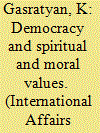

|
|
|
|
|
| Summary/Abstract |
THE development of democratic institutions has gone hand in hand with the evolution of human ideas about spiritual and moral values, natural rights, freedom, justice, and systems of government. It has also been simultaneous with the development of civil (written) law...
|
|
|
|
|
|
|
|
|
|
|
|
|
|
|
|
| 17 |
ID:
148297
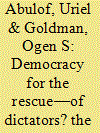

|
|
|
|
|
| Summary/Abstract |
Intrastate conflicts, long eclipsing interstate conflicts, are often internationalized. This paper examines internationalized intrastate conflicts through the types of both the intervening and the embattled regimes. Do democracies, more or less than autocracies, support autocratic governments in their fights against rebels? This paper tests three hypotheses: (1) democracies support autocrats fighting rebels less than autocracies do. (2) Democracies support democratic governments fighting against rebels more than autocracies do. (3) The more democratic two states are, the higher the probability one would support the other’s fight against rebels. Covering all documented external support in intrastate wars (1975–2000), our findings support hypothesis one and two only partly and confirm hypothesis three. However, comparing the two major accounts of the Democratic Peace theory (DPT)—the normative and the structural—our findings corroborate only the former robustly. The paper thus helps enriching the insights of the DPT beyond interstate conflicts.
|
|
|
|
|
|
|
|
|
|
|
|
|
|
|
|
| 18 |
ID:
088902
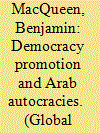

|
|
|
|
|
| Publication |
2009.
|
| Summary/Abstract |
This article explores the intersection between the policy of democracy promotion and the political dynamics of change in the Arab world. Based on extensive field research, this article unpacks the resilience of Arab regimes, asking the question: has the policy of democracy promotion assisted in the maintenance of autocratic and authoritarian regimes in the Arab world? Here, it is argued that the democracy promotion policy of the George W. Bush administration has enabled autocratic and authoritarian regimes across this region to enhance their capacity for social penetration and to exploit a lack of effort to promote the idea of democracy, facilitating direct and indirect modes of repression against opposition forces that have drawn from democracy promotion funding. This has enabled these regimes to enhance the processes of elite change, co-option and imitative institution building that have been central to their resilience in the face of seemingly unavoidable challenges.
|
|
|
|
|
|
|
|
|
|
|
|
|
|
|
|
| 19 |
ID:
145990
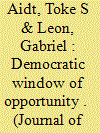

|
|
|
|
|
| Summary/Abstract |
We show that drought-induced changes in the intensity of riots lead to moves toward democracy in sub-Saharan Africa and that these changes are often a result of concessions made as a result of the riots. This provides evidence that low-intensity conflict can have a substantial short-run impact on democratic change and supports the “window of opportunity” hypothesis: droughts lead to an increase in the threat of conflict, and incumbents often respond by making democratic concessions.
|
|
|
|
|
|
|
|
|
|
|
|
|
|
|
|
| 20 |
ID:
132348
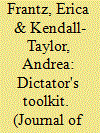

|
|
|
|
|
| Publication |
2014.
|
| Summary/Abstract |
A dictator's motivation for using repression is fairly clear, but why some repress more than others or favor particular types of repressive strategies is less obvious. Using statistical analysis, this article demonstrates that a dictator's reliance on co-optation fundamentally alters how repression is used. Specifically, it finds that co-optation through the use of political parties and a legislature creates incentives that lead dictators to decrease empowerment rights restrictions, like censorship, while increasing physical integrity rights violations, like torture and political imprisonment. This occurs because, by creating parties and a legislature, a dictator draws his potential opposition out of the general public and into state institutions, making it easier to identify who these opponents are, to monitor their activities, and to gauge the extent of their popular support. This reduces the need to impose broad types of repressive measures, like empowerment rights restrictions, that breed discontent within the overall population. At the same time, co-optation creates the risk that rivals, once co-opted, will use their positions within the system to build their own bases of support from which to seek the dictator's overthrow, generating incentives for dictators to increase physical integrity violations to limit the threat posed by these individuals.
|
|
|
|
|
|
|
|
|
|
|
|
|
|
|
|
|
|
|
|
|